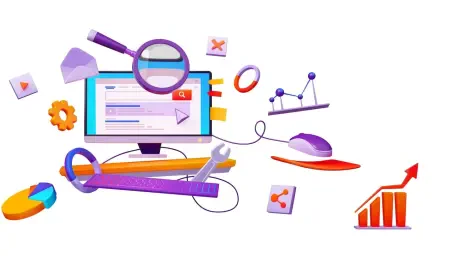In the fast-paced world of digital marketing, efficient collaboration between various entities plays a significant role in enhancing search engine optimization (SEO) efforts. As businesses continuously vie for top positions in search engine results pages (SERPs), they are met with the crucial decision of choosing between on-page SEO tools and human experts for content optimization. This choice is fueled by the need to effectively navigate the complexities of SEO strategies while maximizing visibility.
Understanding On-Page SEO Tools and Human Experts
On-page SEO tools are automated programs designed to assist in optimizing web content by providing recommendations based on data-driven insights. Commonly used tools such as SEMrush, Rank Math, and Screaming Frog offer functionalities including content scoring, technical audits, keyword analysis, and more. These tools streamline SEO processes, making them essential for teams looking to improve SERP rankings efficiently.
Conversely, human SEO experts bring a wealth of experience and strategic capability to digital marketing initiatives. These professionals possess a deep understanding of search algorithms, user intent, and market trends—components crucial for devising comprehensive SEO strategies. Their expertise enables businesses to tailor optimization efforts that align with specific objectives and target audiences.
Core Comparison: On-Page SEO Tools vs. Human Experts
Analytical Capabilities and Precision
On-page SEO tools process large volumes of data, providing real-time feedback on optimization efforts. Their algorithms can analyze top-ranking pages, suggest adjustments, and deliver insights with remarkable accuracy. Such precision aids in maintaining content relevancy and optimal site structure.
Human experts, however, excel in data interpretation and decision-making processes, synthesizing information from various sources for strategic advantage. Unlike tools, they can weigh the qualitative nuances influencing search rankings, allowing them to generate meaningful insights that may escape algorithmic detection. This ability to balance quantitative data with qualitative factors gives human expertise an edge in producing accurate results.
Strategic Thinking and Contextual Understanding
Formulating cohesive SEO strategies requires a comprehensive understanding of both content optimization and broader digital marketing goals. On-page SEO tools provide structured data that can guide strategic planning but lack the ability to seamlessly connect SEO efforts with overall business objectives.
Human experts excel in contextual understanding. Their strategic thinking capabilities enable crafting effective SEO campaigns by analyzing user behavior, market trends, and competitive landscapes. This insight allows for predictions about future shifts, guiding businesses in timely adjustments to their digital strategies while ensuring content alignment with current market demands.
Adaptability and Creative Problem-Solving
The dynamic nature of SEO means search algorithms are frequently updated, impacting ranking factors. On-page SEO tools are programmed to adapt to these changes but are bound by predefined algorithms and might misinterpret subtle context changes. Their responses are often limited to standard adjustments, potentially overlooking the nuanced implications of updates.
SEO professionals, on the other hand, exhibit a high degree of adaptability and creative problem-solving skills. They are adept at tackling algorithm changes by re-evaluating strategies and employing innovative content optimization solutions. This includes leveraging creative insights to enhance user engagement and align content effectively with both brand goals and SEO requirements.
Challenges and Limitations
Despite numerous advantages, on-page SEO tools face limitations primarily stemming from their algorithmic dependence. This reliance may lead to context misinterpretation, wherein tools miss subtle yet significant factors influencing SEO effectiveness. Moreover, these tools function within narrow scopes, necessitating further input from human experts for comprehensive strategy development.
Human experts encounter challenges too, notably the resource intensiveness of their approach. Extensive time and effort are required for thorough analysis and strategy creation, which can be subjective based on individual interpretation. This subjectivity can potentially lead to inconsistencies in strategy execution.
Conclusion and Recommendations
The analysis revealed that both on-page SEO tools and human experts bring distinct strengths and limitations to the field of SEO. While tools offer precision and efficiency in data-driven analysis, human experts provide crucial strategic insights and adaptability. Given these findings, the recommendation is clear: a harmonious integration of both tools and human expertise is essential for optimal SEO outcomes. Businesses that effectively combine the analytical capabilities of tools with the strategic prowess of human experts find new opportunities in content optimization. This collaboration results in content that not only achieves effective rankings but also resonates with the target audience. Embracing this combined approach paves the way for a more comprehensive, flexible, and ultimately successful SEO strategy.









